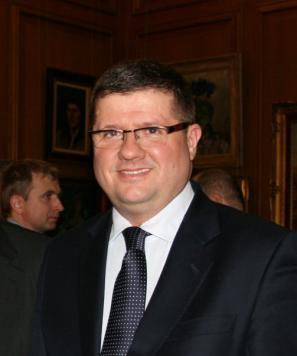The KF Visitors

|
Sławomir Skrzypek - former President of Polish National Bank, at a networking session at the Kosciuszko Foundation with Polish bankers from Wall Street. 2010.

|
Adrian Benepe - former NYC Parks and Recreation Commissioner with Alex Storozynski at the Kosciuszko Foundation, 2010.

|
I am happy for this meeting at the Kosciuszko Foundation headquarters. I am impressed with the passion, enthusiasm and energy of the people who are active here. What a wonderful exhibit and beautiful property. The Foundation has created a fitting legacy to a great Polish hero. I wish you further success and hope to visit more often.
What a beautiful and marvelous home for Polonia in New York.
Maria Kaczynska
New York, Sept. 22, 2009

|
Elżbieta Czyżewska visited KF a number of times. She participated in a Tribute to Warsaw Uprising held on September 17, 2009 during which she read poems by K. K. Baczyński and W. Szymborska. It was probably her last performance.

|
The leaders of Poland's film making community gathered for a reception at the Kosciuszko Foundation celebrating the opening of "Revelation and Camouflage: Polish Cinema from 1930 to the Present."
From left to right: KF Chairman Michael G. Sendzimier, Prof. Maria Kornatowska, Joseph E. Gore, Monika Olszer Jasinska, Juliusz Machulski, Krzysztof Zanussi, Agnieszka Holland, Edward Klosinski, Maciej Karpinski, Krystyna Janda, Boleslaw Michalek, Andrzej Wajda, Krystyna Zachwatowicz and Tadeusz Scibor-Rylski, President of the Polish State Cinematography Committee. 1996.

|
Jacek Kuroń, one of the democratic leaders of opposition against Communist rule in Poland, at the Solidarity event at the Kosciuszko Foundation, May 5, 1989

|
In 1984, The Kosciuszko Foundation sponsored a national tour for prof. Wladyslaw Bartoszewski who traveled across the country lecturing on Polish-Jewish relations during World War II. Bartoszewski was a soldier in Home Army (Armia Krajowa), Polish underground, and co-founder of Zegota, the Council for Aid to Jews. He also organized assistance for the participants of the Warsaw Ghetto Uprising of April 1943 and invited Jan Karski to speak at the Foundation.

|
On Sept. 4, 1976 Cardinal Karol Wojtyła visited the Kosciuszko Foundation and told its members that the work of the Foundation is "particularly important at this time. We realize that culture creates a national identity, and in the end creates the nation itself."
Cardinal Wojtyla, who two years later became Pope John Paul II, praised the work of "The Kosciuszko Foundation, which attempts to diligently serve the interests of the Polish people. We must be grateful to everyone who has contributed to these efforts, and to those who are continuing to work towards these goals. This work is one of the greatest components of our national identity."
This was true in 1976, and it's just as true today. The work of the Foundation preserves Polish culture and works to educate the next generation of Polish and Polish-American leaders. Founded in 1925, the Kosciuszko Foundation promotes closer ties between Poland and the United States through educational, scientific and cultural exchanges. It awards up to $1 million annually in fellowships and grants to graduate students, scholars, scientists, professionals and artists, and promotes Polish culture in America. The Foundation has awarded scholarships and provided a forum to Poles who have changed history.
Petition on German Concentration Camps
Interviews of Polish Victims of Nazi Persecutions
Poland, Visas & What You Can Do
The 70th Anniversary Observance of The Katyn Massacre
|
THE KF HEADQUARTERS 15 East 65th Street New York. NY 10065 tel. (212) 734 2130 |
WASHINGTON D.C. CENTER 2025 O Street NW Washington D.C. 20036 tel. (202) 785 2320 |
WARSAW OFFICE ul. Kopernika 11/8 00-359 Warsaw, Poland tel.+48 (22) 621 70 67 www.kfpoland.org
|
